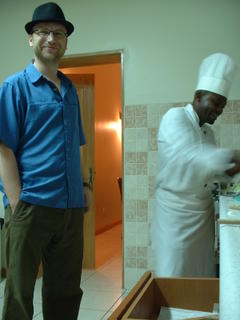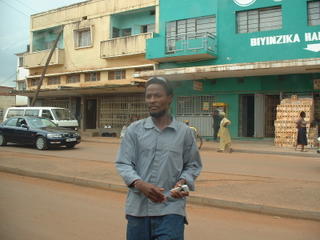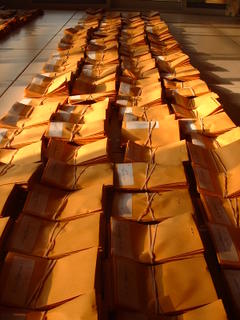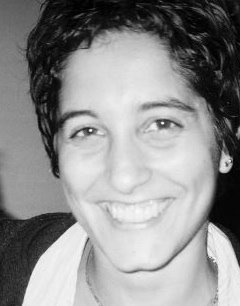My Sheer Good Fortune
Sitting on a small wooden bench today in front of the Kawempe Division City Council office in a slum neighboring our sample area, I was reminded of the very first phase of the project, the pilot of the network game. I had barely set foot in Kampala that the et als were already sending me around dirt roads, garbage dumps, flooding drains, and matoke fields to ask random slum dwellers if they would be willing to participate in a game where we pay them to find someone they do not know. I did a lot of waiting on wooden benches back then. I got a lot of inquisitive looks, suspicious reactions, and curious children with tentative approaches toward the mzungu.
Today, over two months later, I still inspire those same reactions. The looks haven't changed yet they feel different. Less aggressive or intrusive, perhaps, more innocuous. Maybe I've grown accustomed to them, just as I've come to know bits and pieces of this town. The Kubiri Roundabout, between our office and the Mulago Hospital. Kalerwe market down Gayazza Road. The Nakasero Hill shortcut to town. The famous Mawanda Road, the one Alex and I could not find on our very first walk together through the field, the one that ended up being the main road which connects the slumiest of slums in our sample - Butaka Bukirwa, Kifumbira - to the wealthiest zones - Upper Mawanda, Tuffnel. The streets off of Kampala Road where photocopy centers and airline offices congregate. The strip of samosa take-away restaurants in Wandegeya.
I passed our characteristic office building with the non-existent fourth floor today in the taxi on my way back from the Kawempe Division City Council office, and I joked around with my taxi driver about the notorious traffic jams and potholes we successfully evaded.
Except there is no one in the office anymore. And only three of us in the apartment. And only one of us at the gym. Nothing's changed except for us; we're either back to our homes and our other deadlines or wrapping up our stay with a more removed glance. In a couple days i'll be on a plane to a more mzungu place. I'll be working on my own research. I'll be near a university. I'll be closer to the life I know at home in a way. And these smelly markets, flooded mud streets, crazy boda drivers, and inquisitive looks will feel far away.
I'll take home with me what I learned in the past 2 months. I learned to bargain better. I learned a few key words of Luganda. I learned what random sampling in the field looks like. I learned a bit about how to conduct a meaningful interview. I learned how to use a memory stick. I learned how not to use a memory stick. I learned about power generators and how to sleep through a chorus of frog-mating calls. I learned to interpret a few local speech and expression maneurisms, from "Eh!" to "Ah!" to "Okkkkkkk". I learned how to order Indian food. I learned to appreciate unsweetened coffee. I learned how to reconcile and understand inconsistencies between various sources of data. I learned how to SMS even more quickly. I learned to live with very little privacy in a crazed house full of quirky academics.
But perhaps most importantly, I learned about waiting. I learned to wait two hours for an interview appointment. I learned to wait under a Church or a metal sheet roof for the mid-day rain storm to pass by. I learned to wait until the taxi van is full before it departs. I learned to wait 45 minutes when the et als tell me they'll pick me up in 15. I learned to wait through a painfully slow modem connection to get back in touch with the outside world. I learned to wait for mango and eat papaya instead when really, why do we even bother with papaya at all when Mother Nature gave us mango? I learned to observe and read facial expressions as I wait for a translation.
Countless things I have missed in my time here. The people of my life, of course. And salads and tap water. Paved roads and sidewalks. My music and laptop. A good night's sleep. An effective shower. Some quiet space. A good movie. Normal digestion. My cell phone rings. My guitar. My running shoes. Baby carrots. Pickles. Olives. Tortilla chips. My mother's endive pie. Running outside. Traffic rules.
Countless things I will miss when I leave. Kamwokya market on the boda ride to the gym. The Kitante Close hill that I climb every morning as the sun rises over matoke leaves and orange flowers. The Cafe Pap institution. My post-workout cappucino. The calls of the matatu conductors. That speedbump on Kira Road I never know whether my boda will notice. Pepine's "You are welcome" when dinner is ready. Simon's laugh. Pepine's laugh. The boda drivers' art of stating the obvious, from "Madame, you are fearing" to "This road is very very bad." Mangos. And g-nuts. Plantains. And conchas. And the city's hectic round-abouts.
Toni Morrison writes that "It is sheer good fortune to miss somebody long before they leave you." I wonder if the same can be said about a city, for I miss Kampala already.





